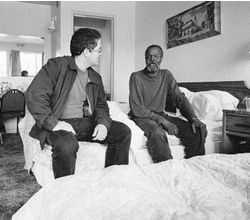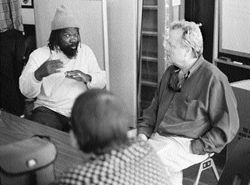Related Articles Case
Management versus Therapy
|
Outcomes Interviews and photographs by Richard Bermack May 2001
Matt McGinley and James James used to live under a freeway off ramp.“They got me this nice little room. Before I was in all kinds of trouble, drunk tickets, assaults,” he says. To get James inside took a group effort. He had been homeless for nearly 19 years, living on the streets and riding the rails. The ACT team had made several attempts over the years to get him inside, but finally when his campsite became a public health hazard and he suffered a serious medical condition, a team of workers went out in the early morning hours to pick him up. “He probably would have died in a matter of months, and now he feels so good and is so thankful,” recalls Eve Ahmed, who first contacted him six years ago. The team’s first task was to clean him up so that he would be acceptable for housing. “I got him to cut his hair by flirting with him. I told him how handsome he would look and took one of his dreadlocks. They were very matted,” Ahmed added. Psychiatric social worker Matt McGinley recalls the ordeal of getting James bathed. “His clothes were impacted to his skin. He had kept the same pair of shoes on for three years. We had to soak his feet and cut through the leather of his shoes and peel them from his skin. Once we got him bathed and got him new clothes and shoes, our next step was to get his SSI application and GA applications in. Our next goal is to make some phone calls to family members that James hasn’t talked to in years. Oh—and then there is one other goal, to get James a puppy,” McGinley stated with a smile. Peggy Schneider and Shara
Shara is one of therapist Peggy Schneider’s model patients. When Schneider started seeing her, Shara was consumed by dark fantasies involving shadow worlds. She had very little desire to live in the real world. She is now very present and has a more positive view of life. Shara describes what it was like when she first came to Berkeley Mental Health: “The darkness is a seductive ruler if you aren’t self aware. I was in a lot of trouble. I was delusional and hearing voices and caught up in a lot of paranoid fantasies. I wasn’t able to cope with the outer world much. My delusions were running my life. I believed them more than anything in the real world. They first started when I was 19, now I’m 38. I was a loner, because the disorder I have, schizophrenia, causes a lot of boundary issues, and I had trouble separating myself from the people around me. Crowds would freak me out. I couldn’t go to movies because I would get sensory overload and I would become part of the movie. “Therapy has been a real symbiotic relationship, of learning from each other, and through that process I have been able to get control over the symptoms that I had and was able to work with them in a way that made them disappear. I think that for the first time I’m able to deal with society and don’t feel like an outsider. I am able to function with people and balance my external and internal world. Before I wasn’t conscious; now I’m self aware and have the ability to evolve, to grow and change. Peggy: “Shara, now that you are getting your life back, what is your next challenge?” Shara: “To get a comfortable place to live and a career.” Josh Kirsch Monica Lee and Pam
Student intern Monica Lee is in a psychology doctorate
program. She especially likes the collaborative approach of working at
Berkeley Mental Health on the ACT team. Pam is a long-time consumer of the mental health system. Her mother took her to a therapist when she was seven years old. The pressure of trying to find an apartment with her boyfriend in Berkeley’s brutal rental market caused her to have a mental breakdown when she was 18. Pam recalls, “By the time we found an apartment I was overboard. He was the love of my life, but when I went into long-term hospitalization he abandoned me.” Pam is manic depressive. “When I’m manic, I feel like I’m on top of the world,” she says. “I want to dance around and bounce off the walls. I bought a clarinet and played him happy birthday, and that ended things.” Working with the ACT team, Pam has adopted a wellness
plan and has learned to control her moods with medication. She says, “Berkeley
Mental Health gives me a lot of support. Coming here is a social event,
something to wake up for. My friends are here. We go to movies, take walks,
and go to the beach. Leland Johnson and Wayne
Wayne is a natural born entertainer. He talks about how he once worked with the Warriors and toured with the Harlem Globetrotters. His life took a bad turn when he got mugged and badly beaten by a street gang. He was hospitalized for a period of time and never quite recovered. He became homeless and wandered around San Francisco and Berkeley living on the streets until he was referred to Berkeley Mental Health by the courts. He was jailed for creating a nuisance, but won over the judge by singing to the court. Wayne recalls, “The judge told me, ‘Now Wayne, you are a nice guy. We can’t have you living on the streets and getting in trouble. You have to take care of yourself.’ So I went to Berkeley Mental Health, and Leland [Johnson] and James [Glenn] have been great. They helped me get some clean clothes and a place to stay.” Wayne was diagnosed as bipolar, got proper medication, and stabilized. “I have seen so many people die. There are so many people I know who are still living on the streets, and now when it’s raining I can just stay in my warm room and watch TV.”
|
||||||||||||





